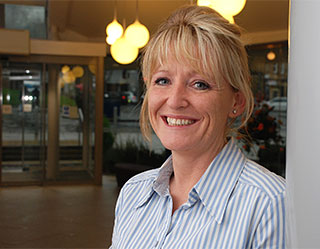Recognition for PhD on differing attitudes to young offenders

Thu, 27 Nov 2014 16:13:00 GMT
Nurse consultant and service manager receives national recognition... three times!
 FORMER retail manager Paula Phillips is achieving recognition as one of the country’s most innovative mental health nurses. She has a demanding role at the South West Yorkshire Partnership NHS Foundation Trust and is a visiting fellow at the University of Huddersfield, where she is carrying out doctoral research that aims to identify which issues impact on staff attitudes when caring for and communicating with young offenders, many of whom are traumatised by abusive backgrounds.
FORMER retail manager Paula Phillips is achieving recognition as one of the country’s most innovative mental health nurses. She has a demanding role at the South West Yorkshire Partnership NHS Foundation Trust and is a visiting fellow at the University of Huddersfield, where she is carrying out doctoral research that aims to identify which issues impact on staff attitudes when caring for and communicating with young offenders, many of whom are traumatised by abusive backgrounds.
Her professional success has resulted in Paula, who is from Leeds, earning a place on a sequence of shortlists at major nursing and health professional awards. She received nominations in two separate categories for the Nursing Times Awards – as Nurse of the Year and Nurse Leader of the Year. When she attended the awards function at London’s Grosvenor House, she was pipped at the post, but it was unprecedented for one nurse to receive nominations in two categories.
Then Paula returned to London for the Health Service Journal Awards. This time she was shortlisted from 1,300 entries in the Clinical Leader category, having been nominated by one of the consultants with whom she works at the South West Yorkshire NHS Foundation Trust. Paula received the ‘highly commended’ title in this category – the judges said Paula was “a remarkable example of a leader who has inspired a team in an extraordinary difficult field”.
Paula is a nurse consultant and the service manager for the Trust’s forensic child and adolescent mental health service and part of her role is to collaborate with the research department. She has close working relationships with the nursing directorate in the Trust and is currently collaborating with colleagues on developing the Trust’s nursing strategy.
She has also embarked on her own PhD project, supervised by Dr Andrew Clifton, Benjamin Raikes of the University of Huddersfield’s School of Human and Health Sciences and Abdullah Kraam of South West Yorkshire NHS Foundation Trust.
 Differing attitudes to young offenders
Differing attitudes to young offenders
Paula is investigating the differing attitudes to young offenders adopted by workers in the criminal justice field. She is specifically exploring attitudes in a children’s secure home. She has an interest in the factors that influence different attitudes. There is a “care versus control” issue apparent in secure settings, she says.
“Different disciplines have different remits. However, all are hopefully working towards the same aim – to provide young people with appropriate care, management and future opportunities,” said Paula.
She added that nurses, such as herself, are trained to give priority to caring for people, whatever their background. In the forensic arena, part of this care includes risk management and public protection. Officers must ensure that young offenders are managed securely in custody. However, their approaches to young people must be balanced with consideration for rehabilitation.
Both sides of the equation adopt differing styles of approach and communication, says Paula, adding that no one approach is inherently better than the other. “There are some fantastic staff,” she stresses. “My research is about trying to understand what influences attitudes and to inform how approaches might be put in place to help us all do things better,” she explains.
“I think there is a need for a difference between disciplines to ensure informed approaches, but there also needs to be more integration. Different disciplines need to understand each other.”
From a forensic mental health perspective, she says. “If the different disciplines could incorporate and understand the developmental stage of a young person and the pathway leading to their custody – such as histories of trauma and abuse as well as offence type and motivation for this – then approaches might be more holistic. It might be more about trying to support them for a better future rather than just managing them.”
Paula entered nursing in 2000, having previously worked in retail management. She considered a new career in probation, but decided to enter the field of mental health, studying for a succession of diplomas and degrees, culminating in the part-time University of Huddersfield PhD research, which she combines with her demanding NHS Trust role.







